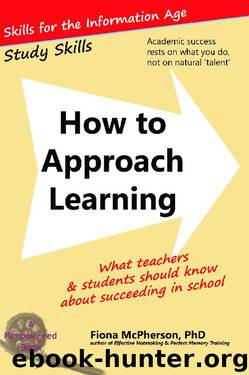How to Approach Learning: What teachers and students should know about succeeding in school (Study Skills Book 0) by Fiona McPherson

Author:Fiona McPherson [McPherson, Fiona]
Language: eng
Format: epub
Tags: Mobilism
Publisher: Wayz Press
Published: 2015-05-05T00:00:00+00:00
How did experts develop these deeper, richer categories? Saying, “10,000 hours of practice”, may be a practical answer, but it doesn’t tell us why the number of hours is important.
One vital reason the practice is important is because it grants the opportunity to acquire a greater diversity of examples.
Diverse examples, diverse contexts, this is what is really important.
What does all this have to do with knowledge and education?
Expertise (a word I use to cover the spectrum of expertise, not necessarily denoting an ‘expert’) is rooted in good categories. Good categories are rooted in their exemplars. Exemplars may change — you may realize you’ve misclassified an exemplar; scientists may decree that an exemplar really belongs in a different category (a ‘fact’ is wrong) — but the categories themselves are more durable than their individual members.
I say it again: expertise is rooted in the breadth and usefulness of your categories. Individual exemplars may turn out to be wrong, but a good category can cope with that — bringing exemplars in and out is how a category develops. So it doesn’t matter if some exemplars need to be discarded; what matters is developing the category.
You can’t build a good category without experiencing lots of exemplars.
Although, admittedly, some of them are more important than others.
Indeed, every category may be thought of as having ‘anchors’ — exemplars that, through their typicality or atypicality, define the category in crucial ways. This is not to say that they are necessarily ‘set’ exemplars, required of the category. No, your anchors may well be different from mine. But the important thing is that your categories have such members, and that these members are well-rooted, making them quickly and reliably accessible.
Let’s take language learning as an example (although language learning is to some extent a special case, and I don’t want to take the analogy too far). There are words you need to know, basic words such as prepositions and conjunctions, high-frequency words such as common nouns and verbs. But despite lists of “Top 1000 words” and the like, these are fewer than you might think. Because language is very much a creature of context. If you want to read scientific texts, you’ll need a different set of words than if your interest lies in reading celebrity magazines, to take an extreme comparison.
What you need to learn is the words you need, and that is specific to your interests. Moreover, the best way of learning them is also an individual matter — and by ‘way’, I’m not (for a change) talking about strategies, which is a different issue. I’m talking about the contexts in which you experience the words you are learning.
For example, say you are studying genetics. There are crucial concepts you will need to learn — concepts such as ‘DNA’, ‘chromosomes’, ‘RNA’, epigenetics, etc — but there is no such requirement concerning the precise examples (exemplars) you use to acquire those concepts. More importantly, it is much better to cover a number of different examples that illuminate a concept, rather than focus on a single one (Mendel’s peas, I’m looking at you!).
Download
This site does not store any files on its server. We only index and link to content provided by other sites. Please contact the content providers to delete copyright contents if any and email us, we'll remove relevant links or contents immediately.
The Art of Coaching Workbook by Elena Aguilar(48037)
Trainspotting by Irvine Welsh(20045)
Twilight of the Idols With the Antichrist and Ecce Homo by Friedrich Nietzsche(17703)
Fangirl by Rainbow Rowell(7825)
Periodization Training for Sports by Tudor Bompa(7323)
Change Your Questions, Change Your Life by Marilee Adams(6637)
This Is How You Lose Her by Junot Diaz(5753)
Grit by Angela Duckworth(4728)
Red Sparrow by Jason Matthews(4654)
Asking the Right Questions: A Guide to Critical Thinking by M. Neil Browne & Stuart M. Keeley(4566)
Paper Towns by Green John(4163)
Room 212 by Kate Stewart(4099)
Ken Follett - World without end by Ken Follett(3968)
The Sports Rules Book by Human Kinetics(3581)
Housekeeping by Marilynne Robinson(3396)
The Motorcycle Diaries by Ernesto Che Guevara(3325)
Introduction to Kinesiology by Shirl J. Hoffman(3297)
Exercise Technique Manual for Resistance Training by National Strength & Conditioning Association(3286)
Double Down (Diary of a Wimpy Kid Book 11) by Jeff Kinney(3267)
